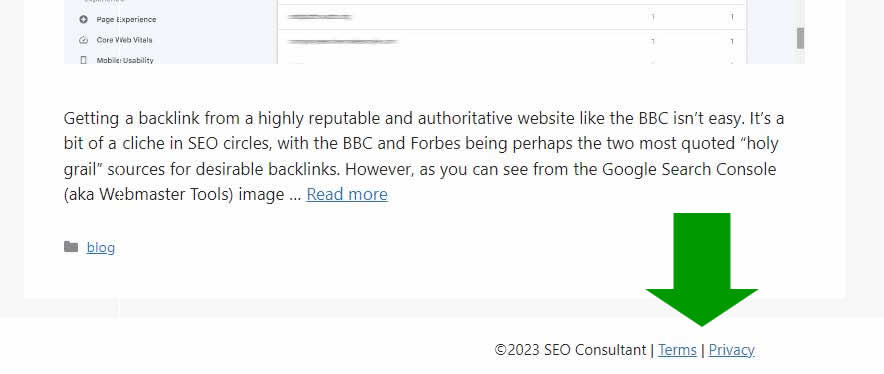As an SEO consultant, I’m sometimes asked whether or not it’s a good idea to make a “privacy policy” page and a “terms and conditions” page “no follow” links (rel=”nofollow”). The reason being that these pages are often in the footer of every page on a website and unwanted “link juice” might flow to them unnecessarily.

As you’d expect, this topic often crops up in SEO circles so let’s try and put the answer to bed once and for all.
Do your privacy policy and terms pages affect SEO?
First, let’s take a look at what other people have said. There’s an old post on StackExchange titled “Do the contact us and privacy policy Pages affect SEO?”
In it, they discuss this topic and one user also links to an old Google video by Matt Cutts that touches on this very subject.
In the video titled “How does required duplicate content (terms and conditions etc) affect search?” Cutts says:
“The answer is, I wouldn’t stress about this unless the content that you have that’s duplicated is spammy or keyword stuffing or something like that.. then we might take action on it but if it’s.. legal boiler plate that is sort of required to be there, we might at most not want to count that but it’s probably not going to cause you a big issue.”
He goes on to say:
“We do understand that lots of different places across the web do need to have various disclaimers legal information in terms and conditions, that sort of stuff, and so it’s the sort of thing where if we were to not rank that stuff well, then that would probably hurt our overall search quality so I wouldn’t stress out about that”
Matt Cutts
So there you have it; straight from the horse’s mouth. In effect, Cutts is saying that Google is well aware of what these pages are so there is no need to add the no-follow attribute to them for SEO purposes. In fact, if you do, then it is possible that it could actually hurt your rankings rather than benefit them.
A sign of trust
It’s important to reiterate that your privacy policy and terms and conditions pages are a sign of trust and Google is well aware of this.
As a result, my advice would be to leave them as “do-follow” links. I have actually tested this theory in the past on a couple of different sites to monitor whether there was a change in rankings when both privacy policy and terms and conditions links were made rel=”nofollow”. I left the no-follows in place for just over two months and didn’t notice any difference in ranking. To err on the side of caution, I removed the no-follow attribute and left them as do-follow.
What does ChatGPT say about it?
Unless you’ve been living under a rock, you’ll be very aware of exactly what Chat GPT is. I thought I’d ask the AI Guru and hero-of-the-moment what it thought so I posed the following question:
“Should I make my privacy policy a no follow for SEO purposes”
The unequivocal response it gave was:
“No, you should not make your privacy policy page a “no-follow” link for SEO purposes because it’s an important part of your website and should be easily accessible to both users and search engines. Making it a “follow” link will ensure that search engines can crawl and index the page, and that it’s included in your website’s overall authority and ranking potential.”
ChatGPT
I’ll leave it up to you, the reader, to decide for yourself what you think is best as the above is just my 2 cents worth on whether or not you should use the rel=”nofollow” attribute when linking to your terms and conditions and privacy policy pages.
